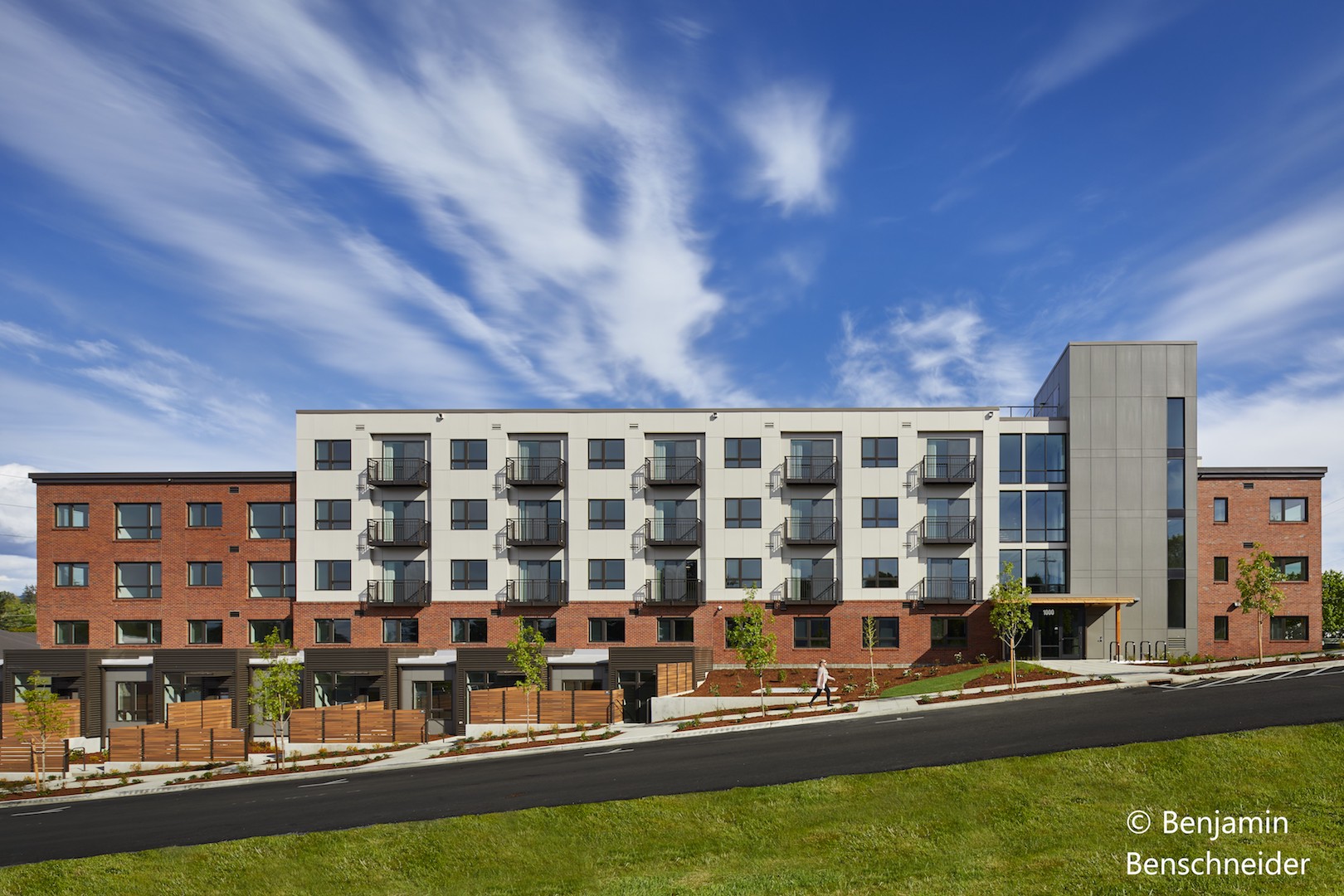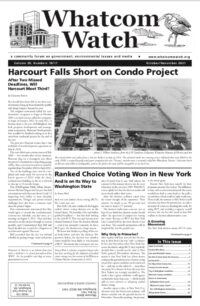by Brien Thane, Kate Donnelly, and Tony Casale
Editor’s Note: There are over 100 organizations in Whatcom County working to provide supportive services to those experiencing chronic poverty and its associated effects: ad- diction, homelessness, incarceration, mental illness, and unemployment. Whatcom Watch believes these organizations often labor unnoticed by citizens — this column is designed to add daylight to their endeavors. We have contacted the organization appearing in this column and asked them to explain their mission. Because, in challenging times, being inspired and perhaps empowered by the acts of others is more important than ever.
For over 75 years, the Bellingham & Whatcom County Housing Authorities (BWCHA) have offered opportunities for people to thrive by ensuring access to quality, affordable homes. Our vision that every person has the opportunity to live in a safe, secure, affordable home is more relevant now than ever.
BWCHA is two Public Housing Authorities, comprised of the Housing Authority of the City of Bellingham, established in 1945, and the Housing Authority of Whatcom County, established in 1970. Housing authorities receive funding from the U.S. Department of Housing and Urban Development (HUD), but are independent governmental entities created under state law to address unsafe housing conditions and housing shortages. Each housing authority is governed by a board of five volunteer commissioners appointed by the mayor of Bellingham and the county executive.
Throughout Whatcom County, BWCHA provides affordable housing and rental assistance to more than 3,500 households. We do this through three primary lines of business: subsidized housing manager, rental assistance provider, and affordable housing developer.
As a subsidized housing manger, BWCHA operates multifamily rentals funded through HUD’s Public Housing Program, and the U.S. Department of Agriculture’s Rural Development program.
Public Housing Established in 1937
Public housing was established in 1937 when the country was coming out of the Depression era, and there was an identified need to address substandard living conditions. This was the U.S. government’s first major effort to support our nation’s housing needs, and, as such, all development, maintenance, and ongoing operating expenses are directly subsidized through congressional appropriations.
Community members who live in public housing typically pay 30 percent of their adjusted income toward rent, and there is no minimum income requirement, but there are income limits. Throughout Whatcom County, approximately 875 individuals live in public housing, including 196 youth under age 18. Most of our public housing portfolio is designated for elders or non-elderly persons living with a disability (43 percent and 36 percent of current households respectively), and 80 percent of the current tenants rely on fixed income sources.
As a rental assistance provider, BWCHA administers the Housing Choice Voucher (HCV) program, often referred to as Section 8. The HCV program was created in 1974 when the federal government shifted its focus from substandard housing to unaffordable housing. HUD also acknowledged that government-funded public housing could not single-handedly meet the nation’s housing needs. Unlike public housing, most rental assistance programs allow families to move throughout Whatcom County and beyond.
Through the HCV program, BWCHA distributes $1.4 million dollars in rental assistance each month to make private market rentals affordable to low-income households. Throughout Whatcom County, over 3,200 individuals benefit from HCV assistance, including 1,121 youth under age 18. Among participants, 64 percent are elders or living with a disability, and 82 percent have incomes below 30 percent of the area median ($26,500 for a family of four). Rental assistance works to decrease rent burden for community members so they can meet other essential needs, and it guarantees landlords a portion of their rental payment.
As an affordable housing developer, BWCHA navigates the complex world of applying for and blending multiple funding sources from the public and private sectors. These resources are critical because they often come in the form of soft debt with favorable terms, instead of required monthly payments with market-rate interest, which is typical of conventional hard debt financing. As a result, BWCHA is able to maintain lower tenant rents. BWCHA has successfully developed over 1,080 homes using affordable housing development financing tools including the Federal HOME program, State Housing Trust Fund, Bellingham Home Fund (Housing Levy), and, most significantly, the IRS Low-Income Housing Tax Credit program (LIHTC).
Samish Commons
In addition, when BWCHA designs a new development, we strive to create a diverse community that integrates a mix of income set asides and household compositions. The most recent example is the Samish Commons multiphase, mixed-income, and multigenerational development located on the former site of the Aloha Motel. When all phases are complete (early/mid-2023) Samish Commons will consist of 171 apartments affordable for households with incomes ranging from 30-60 percent of the area median. A portion of units will be designated for persons living with a disability, elders, and community members transitioning out of homelessness.

The Bellingham & Whatcom County Housing Authorities recently constructed Samish Commons located on the former site of the Aloha Motel on Samish Way. When all phases are complete, it will consist of 171 apartments of mixed-income and multigenerational residents.
In our roles as subsidized housing manager, rental assistance provider, and affordable housing developer, we acknowledge that we cannot be successful alone. Our partnerships with the city of Bellingham, Whatcom County, and local nonprofits (including but not limited to Lydia Place, Opportunity Council, Northwest Youth Services, Pioneer Human Services, Catholic Housing Services, and Lake Whatcom Treatment Center) are critical to the success of our programs, our clients, and our community as a whole.
Even with the good work of our dedicated team and partners, we recognize there is a significant gap between available resources and housing needs. This a multifaceted problem, but there are glimmers of hope.
Aging Public Housing Portfolio
The public housing program consists of a finite number of units, and, with very few exceptions, HUD will not authorize the development of new public housing. Nationally, there is a $75 billion backlog of deferred maintenance within our country’s aging public housing portfolio, and Congressional appropriations have proven unable to keep pace. HUD is however now offering housing authorities a variety of tools so they can leverage private funding and equity to pay for deferred maintenance.
Rental assistance programs are an area where we have seen modest expansion at a federal level, and BWCHA pursues every opportunity. Over the past few years, BWCHA has been able to increase the number of vouchers available for persons with disabilities and veterans, but rental assistance is only part of the puzzle.
Participants need to be able to locate suitable housing and Whatcom County’s extremely low rental vacancy rate makes this very challenging. The University of Washington Center for Real Estate Research’s Spring 2021 Market Report indicated an 0.8 percent rental vacancy rate in Whatcom County; whereas, a healthy vacancy rate is typically considered to be 5-7 percent. This means Whatcom County does not have an adequate number of rentals compared to the number of renters. Additional rental assistance can mitigate the cost burden associated with living in Whatcom County, but, with our current vacancy rates, there is significant competition for each available rental unit.
There are also efforts to increase the amount of financing that is available for development of affordable housing. BWCHA is grateful for the city of Bellingham and our community members who continue to support the Bellingham Home Fund. This is a critical resource for filling the remaining gap in housing financed through the federal tax credit and other public programs. Over the past couple years, the state Legislature has increased appropriations to the Housing Trust Fund and passed House Bills 1406 and 1590, which created new resources for affordable housing construction.
Local Leadership
Both the Bellingham City Council and Whatcom County Council have demonstrated leadership by enacting and implementing these new resources. Federal pandemic relief legislation has also included significant resources for affordable housing, and there is hope that the LIHTC program may see expansion in the near future.
Despite the many challenges that our community faces around housing affordability, BWCHA’s staff and commissioners remain dedicated to expanding housing opportunities, increasing access, and assisting participants in their efforts to maintain safe, stable housing. After the completion of Samish Commons, we have several new construction developments planned. We recently launched online portals that make our programs more accessible to clients, residents, landlords, and community partners.
More information about BWCHA can be found on our website www.BellinghamHousing.org or by emailing us at info@BellinghamHousing.org. Our team is committed to the careful stewardship of resources and continuous improvement in service to this wonderful community.
________________________
Tony Casale has worked with BWCHA since 2015 and is currently the Director of Leased Housing. Over the last 15 years, Tony has dedicated himself to a myriad of affordable housing and homelessness initiatives ranging from program management, community development, financing, and policy work.
Kate Donnelly has been with BWCHA for 15 years, building an extensive knowledge of successful program management. Currently in the role of Chief Operating Officer, Kate strives to build strong teams, providing opportunities for growth and in turn providing the best service possible to our clients and community.
Brien Thane joined BWCHA in 2013 as Director of Asset Development, becoming Executive Director in 2018. He has over 35 years’ experience in affordable housing development, policy, and organizational leadership. Throughout his career, Brien has sought to build and sustain broad community partnerships and coalitions that amplify the voices of disenfranchised people.





























